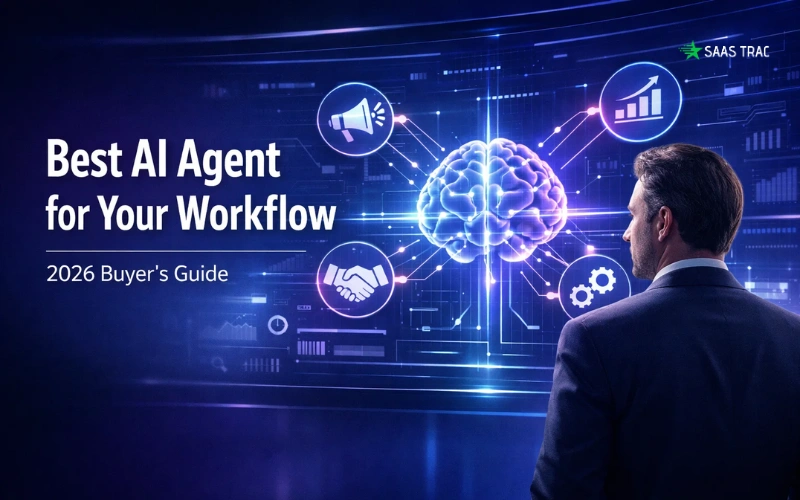Every business wants to save time, reduce repetitive tasks, and keep operations running smoothly. That’s where AI tools for business automation come in, powered not just by rules and triggers, but by intelligent systems that learn and adapt.
From AI tools for marketing to project planning, and from content generation to customer support, automation now touches nearly every corner of a business. Companies are also turning to AI productivity tools to speed up internal communication, while tools built for AI workflow automation are helping connect scattered platforms without writing code. Whether you’re looking for AI tools for productivity or exploring how to implement AI for workflow automation, there’s a growing list of options making a real impact.
In this blog, we’ll walk through the top AI tools for business automation, highlighting how they improve efficiency across writing, visuals, operations, and team collaboration. Each tool listed here brings real, practical value that fits right into your existing workflow.
Top AI Tools For Business Automation
1. ChatGPT
Best for: Writing emails, coding support, research, and idea generation. ChatGPT stands out as a flexible and intelligent assistant across multiple business functions.
Powered by OpenAI’s GPT-4o, it can handle complex requests such as summarizing documents, writing content for emails and websites, answering research queries, or generating code snippets. For marketing teams, it serves as a brainstorming partner. For developers, it’s a helpful coding companion. Its real value increases when combined with automation platforms. For instance, you can connect ChatGPT with Gmail or Slack via Zapier to generate automated replies, summarize form responses, or translate communications, cutting down manual hours and boosting responsiveness.
2. Claude (Anthropic)
Best for: Safe and collaborative document creation
Claude by Anthropic is an AI assistant that prioritizes clarity, reliability, and safe outputs. Designed to support collaborative tasks, Claude is excellent at helping users build drafts, technical documents, or creative outlines. One of its distinct features is the creation of “Artifacts”—interactive content that lives alongside your conversation thread. This real-time editing feature is perfect for teams iterating together, especially when working on sensitive content or in regulated industries that require higher safety in language generation. Businesses looking for secure AI tools for business automation find Claude especially suitable.
3. Zapier Agents
Best for: Workflow automation across apps
Zapier Agents take traditional Zapier automation a step further by incorporating AI capabilities. Think of them as digital workers that follow your instructions across apps—extracting CRM data, cleaning spreadsheets, triggering Slack alerts, or populating reports. You don’t need to write any code to get started. With native support for thousands of apps like Notion, HubSpot, Google Sheets, and more, Zapier Agents help centralize disconnected tools into one smooth workflow. It’s especially useful for sales, marketing, and operations teams managing multi-tool ecosystems. A strong example of AI tools for business automation in action.
4. Perplexity
Best for: AI-powered research with citations
Perplexity is more than an AI chatbot—it acts as a real-time research engine that provides answers with sources. This makes it invaluable for content creators, analysts, and decision-makers who rely on credible, updated information. Its ability to retain conversation history allows for contextual follow-up questions, and it retrieves answers based on cited sources, reducing the risk of misinformation. Businesses use it to inform content, reports, strategy sessions, and more—another effective application of AI tools for business automation.
5. Jasper
Best for: Scalable content creation
Jasper is built for marketing teams looking to scale content creation across blogs, social media, and ad platforms. It provides a library of pre-built templates, supports multiple brand tones, and offers SEO-enhancing features. With Jasper, teams can create optimized content for different channels, generate visual creatives with image tools, and even collaborate across departments in real time. Its AI engine continuously learns from your input to stay aligned with your brand’s voice. As one of the most popular AI tools for marketing and automation, it boosts content production at scale.
6. Grammarly
Best for: Content quality and editing
Grammarly goes beyond correcting grammar. It helps professionals maintain a consistent tone, clarity, and engagement in their written communication. It offers suggestions for rewriting, checks for overuse of passive voice, and adjusts tone depending on the audience intent. For customer service, content marketing, and internal communication, Grammarly ensures that your writing is always clear and professional, reducing back-and-forth edits. As one of the most accessible AI tools for productivity, it helps teams communicate with confidence.
7. Runway
Best for: AI-enhanced video creation
Runway’s Gen-3 model helps teams create videos from text prompts, animate visuals, and enhance footage with advanced editing features. It’s designed for non-experts to build dynamic video content without expensive software or production teams. This tool works well for marketing departments looking to produce explainer videos, social content, and training visuals with a fast turnaround. Among AI tools for business automation, it brings significant value to creative workflows.
8. DALL·E 3
Best for: AI image generation DALL·E 3,
Now integrated within ChatGPT, transforms written prompts into high-quality images. It can generate logos, infographics, product mockups, and social creatives in minutes. This eliminates long wait times for graphic design and allows marketers or business owners to quickly visualize concepts, test creative ideas, or build assets for campaigns. DALL·E 3 supports creative operations, making it one of the best AI tools for business automation in visual content.
9. Notion AI
Best for: Team knowledge and productivity management
Notion AI integrates seamlessly within your workspace to improve how teams handle knowledge and tasks. It can summarize long notes, draft updates, or extract critical action points from meeting minutes—all within the app. Its AI features reduce the time spent on administrative tasks and ensure your knowledge base remains updated, accessible, and actionable. As part of your broader AI tools for business automation stack, Notion AI enhances collaboration and document clarity.
10. Asana +
Best for: Task and project management
Asana’s AI features guide teams by setting smart goals, detecting workflow risks, and auto-summarizing project statuses. These features allow team leads to focus on priorities without getting bogged down in micromanagement. Asana is especially useful for large organizations managing complex projects across teams, helping them stay aligned with minimal manual updates. As AI tools for business automation become more essential, Asana provides intelligent project oversight.
11. FeedHive
Best for: AI-powered social media automation
FeedHive empowers social media managers by offering smart scheduling, AI writing assistance, and post-performance optimization. Its features include conditional logic (e.g., publish this post only if engagement is high), AI-rewritten suggestions, and auto-reposting of evergreen content. It also includes analytics to monitor what’s working and recommend data-backed improvements. FeedHive reduces time spent on planning and posting content, enabling consistent online engagement. This tool exemplifies how AI tools for business automation can simplify social media workflows and enhance overall team efficiency.
12. Vista Social
Best for: Centralized social media management with AI tools
Vista Social supports scheduling, performance tracking, and content optimization across multiple platforms, while offering integrated AI tools for writing, summarizing, and repurposing posts. It’s well-suited for agencies or internal teams managing multiple accounts, enabling smoother workflows from planning to publishing. By incorporating this into your toolkit of AI tools for business automation, you can streamline your entire content pipeline.
Also Read
Zapier Review | Best Workflow Automation Software
Asana Review | Solid Task Management And Collaboration Software
13. Buffer (with AI writing assistant)
Best for: Tailoring content to platform style
Buffer’s AI writing assistant helps shape posts that match the nuances of each social platform. A single message can be turned into a polished tweet, an engaging Instagram caption, or a professional LinkedIn update. This saves time and ensures better engagement, especially when you’re trying to maintain brand voice across different audiences. When used as one of your AI tools for business automation, Buffer supports consistent branding with platform-specific content.
14. ElevenLabs
Best for: Voiceovers and audio content generation
ElevenLabs uses AI to create natural-sounding voiceovers for training videos, podcasts, and narrated presentations. You can generate multilingual audio content or create a brand-specific voice to ensure consistency. For brands venturing into audio content or expanding video production, this tool adds professional-grade narration without high production costs. It showcases the reach of AI tools for business automation in modern multimedia strategies.
15. Mem
Best for: Organizing and retrieving knowledge with AI tagging
Mem uses AI to auto-tag and organize your notes, conversations, and resources. Over time, it learns your habits and retrieves relevant content when needed—no manual sorting required. This helps teams avoid information silos and access insights quickly when working on projects or responding to inquiries. As part of your AI tools for business automation stack, Mem boosts productivity by centralizing collective knowledge.
16. Wordtune
Best for: Rewriting and refining business content
Wordtune helps businesses improve clarity and tone in their written communication. It’s not just a grammar checker—it offers contextual rewrites, expansions, or concise alternatives for sentences. This is useful for drafting emails, reports, blog posts, or proposals. With its AI understanding of language, Wordtune helps teams maintain professionalism and brand tone across all channels. Marketers can brainstorm alternate headlines, sales teams can sharpen pitches, and HR can rewrite policy docs more clearly. As one of the top AI tools for business automation, Wordtune supports scalable content refinement.
17. ProWritingAid
Best for: Creative and professional writing assistance
ProWritingAid supports editorial teams with grammar, punctuation, and style correction tools, making it ideal for crafting longer content like whitepapers, reports, or articles. What sets it apart is its in-depth analysis, providing writing scores, readability metrics, and structural feedback. Its integrations with tools like Google Docs and Scrivener ensure workflow continuity. ProWritingAid stands out as a writing-first solution among AI tools for business automation, particularly for publishing and editorial teams.
18. Descript
Best for: Script-based video and podcast editing
Descript simplifies media editing by converting audio and video into editable text. Users can edit the transcript to make precise changes to the video or podcast content, like removing filler words or adding voiceovers. For businesses creating webinars, product demos, or customer interviews, this saves hours of editing time. It even supports AI-generated voice cloning. Among AI tools for business automation, Descript excels in making audio-visual production more accessible.
19. Filmora
Best for: Video polishing with built-in AI tools
Filmora is a user-friendly video editing platform packed with AI features like background noise removal, auto-reframe, and motion tracking. These tools help teams polish raw footage quickly for presentations, ads, or tutorials. Marketing teams can use AI to clean up influencer videos, while HR might use it to create training content. Filmora makes video editing accessible and efficient, fitting perfectly into the ecosystem of AI tools for business automation.
20. Midjourney
Best for: Artistic AI image generation
Midjourney generates stunning, imaginative visuals from text prompts, making it an excellent tool for designers and marketers seeking unique visuals. It’s effective for conceptual or moodboard-style graphics. For branding projects or campaign ideation, Midjourney can generate a wide array of interpretations quickly. It’s a prime example of how AI tools for business automation can support creative ideation and speed up design timelines.
21. Ideogram
Best for: Creating AI-generated images with readable text
Ideogram excels at generating images that include clear, stylized text—a known challenge for most AI models. Businesses can use it to produce custom social media graphics, quote cards, flyers, or banner ads with embedded messaging. With easy prompt refinement and real-time adjustments, it empowers content creators to design quickly. Among AI tools for business automation, Ideogram plays a key role in simplifying branded visual content creation.
22. AIVA
Best for: Composing AI-generated background music
AIVA helps businesses produce background scores tailored to their content. Whether you’re building an app, creating explainer videos, or hosting virtual events, AIVA offers music in various genres. With royalty-free licensing and timeline editing features, it’s a music automation powerhouse. Brands prioritizing sonic branding will find this one of the more niche yet powerful AI tools for business automation.
23. Suno
Best for: Full music generation from prompts
Suno allows you to generate complete songs, including vocals and lyrics, from a simple prompt. It’s a great tool for campaigns that need original audio content. Its intuitive interface and fast turnaround make it a favorite among content creators and marketers. Within the larger pool of AI tools for business automation, Suno stands out for audio creativity.
24. Personal AI
Best for: Automating personal responses using custom memory
Personal AI acts as your communication co-pilot by learning from your past conversations and documents. It mimics your tone and style to draft emails, messages, or proposals—ideal for professionals who want to automate without losing personalization. As part of your AI tools for business automation stack, it enhances responsiveness without increasing manual effort.
Wrapping Up
Business automation isn’t just a trend—it’s quickly becoming the standard for how modern teams get more done with less friction. Whether you’re a solo founder trying to streamline your day or a growing team juggling content, data, and deadlines, there’s an AI tool out there that can make your life easier.
From simplifying content creation with tools like Jasper and ChatGPT to managing complex workflows with Zapier Agents or Notion AI, these platforms do more than just save time—they help your team stay focused on the work that truly matters. And with solutions for writing, editing, visuals, audio, project management, and more, automation isn’t limited to just one department anymore.
The key isn’t to adopt every tool but to identify where the bottlenecks are in your business and choose the right AI-powered solution to fix them. Start small. Test what works. Then build your automation stack as your needs evolve.
One step at a time, the right AI tools for business automation can help you work smarter, not harder.






























